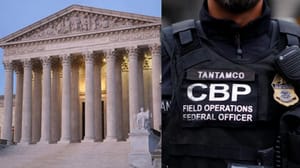
The Supreme Court has ruled in favour of a CBP agent in a suit involving a cross-border shooting of a Mexican child in 2010.
Alito: “Exercise Caution” Before Applying Law to New Context
The Supreme Court ruled 5-4 in favour of the CBP agent, Jesus Mesa Jr., in a suit brought by the parents of 15-year-old Sergio Adrián Hernández Güereca. The family claimed the teen was shot while playing a game that involved running back and forth across the border, but Mesa Jr. said the teen threw rocks at him during an attempt to illegally enter the country. However, the Court ruled that no matter what happened, that border patrol agents could not be sued via a “Bivens claim” when it came to cross-border incidents.
“Bivens claims” come from the 1971 opinion on the Bivens v. Six Unknown Fed. Narcotics Agents case, which ruled that under the 4th Amendment, anyone who claimed they were illegally arrested and searched could claim against the officers involved. In his opinion, Justice Samuel Alito wrote that the separation of powers in the constitution “requires us to exercise caution before extending Bivens to a new ‘context,’ and a claim based on a cross-border shooting arises in a context that is markedly new.”
Alito argued that a cross-border incident involving the CBP should not be opened to scrutiny under Bivens. Firstly, it “involves an event that occurs simultaneously in two countries and affects both countries’ interests,” and therefore “such an incident may lead to a disagreement between those countries,” so no suits should be brought in order to “avoid upsetting the delicate web of international relations.” Secondly, the regulation of “the conduct of agents at the border unquestionably has national security implications,” and so “the risk of undermining border security provides reason to hesitate before extending Bivens into this field.”
RELATED: Sen. Sanders: Illegal Immigrants Are ‘Our People’
The Supreme Court is Protecting Our Agents!
Of course, the liberal, open-border justices on the Supreme Court dissented. In her dissenting opinion, Justice Ruth Bader Ginsburg argued that “neither U.S. foreign policy nor national security is in fact endangered by the litigation,” and that “concerns attending the application of our law to conduct occurring abroad are not involved, for plaintiffs seek the application of U.S. law to conduct occurring inside our borders.”
RELATED: Trump Administration Waiving Federal Contract Laws for Border Wall
Overall, this is a big win for the security of this country! The Supreme Court has affirmed the right of CBP officers to not be sued for every decision they make when protecting the interests of American citizens. If it had gone the other way, I am sure Border Patrol agents would be always looking over their shoulder, and would be hesitant to make the quick decisions that are needed in their positions.
